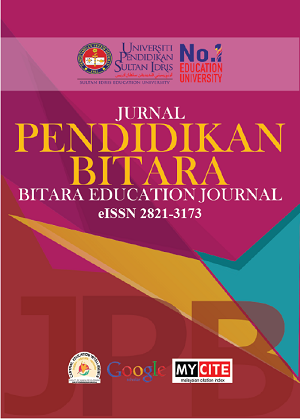Analysis of Figurative Language style in the novel "Bimasakti Menari" text component of fifth grade Malay literature
Analisis gaya Bahasa Figuratif dalam novel “Bimasakti Menari” teks komponen kesusasteraan Bahasa Melayu tingkatan lima
DOI:
https://doi.org/10.37134/bitara.vol16.1.3.2023Keywords:
Language style, figurative, Novel, Component Text, LiteratureAbstract
Figurative language is one of the implicit language styles that is an important part of literature and linguistics. The figurative language contains implicit meaning, but the message is to be conveyed more effectively, even the use of figurative language can avoid things that offend emotions. In addition, the implicit language style is the choice of community speakers because they are shy to express their feelings and often hide in their conversations. This is because the speaker is worried that what is being said will be offensive, impolite or shameless. The purpose of this research is to identify the use of figurative language style in the selected novel. The research instrument used is the novel Bimasakti Menari. This study of figurative language style is qualitative. The text analysis method was used to obtain research data related to the figurative language style studied from the novel Bimasakti Menari KOMSAS text Form 5. Research data related to figurative language style will be analysed according to categories based on Mildred L. Larson (1984) namely hyperbole, metonymy, metaphor, onomatopoeia, personification and simile. This study was also conducted to see the percentage of frequency of use of figurative language style in this KOMSAS text. With this study, readers, especially students, can identify the type of language style used by the writer as well as apply it in everyday life. Overall, the use of language style should be given more attention by teachers, students and the Malaysian Ministry of Education (KPM) to create a society aware of good language use.
Downloads
References
Abu Bakar, R. (2018). Hikayat Pelanduk Jenaka: Perkembangan Kecerdasan Bodily Kinesthetic dan Kecerdasan Bahasa Kanak-kanak dan Remaja. Jurnal Pendidikan Bitara UPSI, 11, 33–51.
Arumainathan, K., Eng Hock, K., & Shaffeei, K. (2023). Kajian Keberkesanan Aktiviti main Peranan “I Can Communicate Too” Terhadap Murid masalah Pembelajaran Berkefungsian Rendah. Jurnal Pendidikan Bitara UPSI, 16, 55–76. https://doi.org/10.37134/bitara.vol16.sp.5.2023
Damayanti, L. (2019). Analisis Penggunaan Similes dan Metaphors pada Novel Berjudul “Hard Time” sebagai Tulisan Deskriptif. JSHP: Jurnal Sosial Humaniora dan Pendidikan, 3(2), 105-110.
Ismail, M. S., & Sarudin, A. (2022). Interpretasi partikel wacana ‘Lah’ berdasarkan ilmu Balaghah. Al-Irsyad: Journal of Islamic and Contemporary Issues, 7(1), 865–878. https://doi.org/https://doi.org/10.53840/alirsyad.v7i1.290
Keraf Gorys (1996). Diksi dan gaya bahasa. Penerbit Pt Gramedia Pustaka Utama, Jakarta.
Larson, M. L. (1984). Meaning-based translation: A guide to cross-language equivalence. Lanham, MD: University Press of America.
Pratama, R. Y. (2015). Onomatope Dalam Buku Cerita Anak Karya Hans Cristian Andersen: Kajian Fonologis (Doctoral dissertation, Universitas Widyatama).
Ricoeur, P., Czerny, R., McLaughlin, K., & Costello, J. (1977). The rule of metaphor: Multi-disciplinary studies of the creation of meaning in language. United Kingdom: Routledge & Kegan Paul
Sutopo, B. (2014). Hiperbola dan Simile dalam Novel Mukenah & Sajadah Untuk Soya Karya Maria Bo Niok: Kajian Stilistika. Sasindo. Jurnal Pendidikan Bahasa dan Sastra Indonesia, 3 (1), 109-121.
Downloads
Published
Issue
Section
License
Copyright (c) 2023 Nuur Hikma Natasha Lamsah, Anida Sarudin, Mohd Sufian Ismail

This work is licensed under a Creative Commons Attribution-NonCommercial-ShareAlike 4.0 International License.





